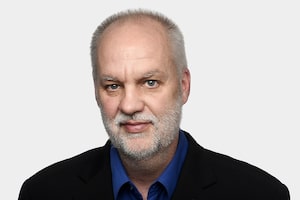Gerber babies are always I-just-want-eat-him-up beautiful and, with his contagious smile and dapper bow tie, Lucas Warren is no exception.
That he has facial traits that could identify him as having Down syndrome is beside the point. At least, it should be. But, of course, it's not.
For the first time in 91 years, the corporate image of the perfect baby is that of a child with a visible developmental disability.
That is a big deal. It sends a message of acceptance. It raises awareness.
As Cortney Warren, the boy's mother, said: "We hope this opportunity sheds light on the special needs community and educates people that with acceptance and support, individuals with special needs have the potential to change the world – just like our Lucas."
At the risk of sounding cynical, however, it needs to be said that having a "spokesbaby of the year" with Down syndrome, regardless of how many aw-shucks media stories it generates, is not the same thing as acceptance and support.
As Sue Robins, the mother of a child with Down syndrome and author of the wonderfully insightful "health care big mouth" blog wrote, this is a watershed moment for families with a baby with a developmental disability.
But for those who've been around the block a few times, whose children have lived with Down syndrome for a long time, it elicits more questions than answers: "Is that all there is? When a large corporation chooses a baby with Down syndrome to represent their product, does this mean that my son's own life is going to improve? Will he now have friends? Will I have funding for therapies, respite or childcare for him now? Will he be able to find a job? Love? Will he be safe as he makes his way in this world? These are deeper questions that bubble up for me," Ms. Robins wrote.
Her point, crudely stated, is that Lucas is cute but what happens when he isn't cute any more? What happens when, like Ms. Robins's 14-year-old son, Aaron, he is a gangly, moody teenager and, when he is an adult, looking for real work and meaningful relationships?
Will Gerber be as keen to give Lucas a job as it is to paste his photo everywhere to sell baby food? Will the coo-cooing parents of today be as pleased when Lucas falls in love and marries one of their children?
People with disabilities – physical, developmental, psychiatric – and their families know all too well it is not a given that higher visibility means greater acceptance.
We routinely do prenatal screening for genetic anomalies, including trisomy 21, the formal name for Down syndrome. An estimated 80 per cent to 90 per cent of parents opt to terminate the pregnancy, in large part because health-care providers tend to focus on the health complications that can occur.
About half of children born with an extra copy of chromosome 21 have heart defects that require surgery; they can also experience vision, hearing and thyroid problems; children with Down syndrome also tend to have intellectual disability, though it varies widely from mild to severe.
People with Down syndrome can also lead full, rich lives. The stereotype that they are always happy is just that, a stereotype. One of the dark realities is that people with developmental disabilities are far more likely to be victims of exploitation and abuse; predators prey on the vulnerable. Many are condemned to poverty by miserly disability payments and an inability to find work.
What people with disabilities, including Down syndrome, want is the same thing as everyone else, a good life: friends and family, basic wealth, to feel safe, to have a place of their own and to have the choice and the ability to make a contribution to society.
There are countless initiatives and organizations that have been created to assist people with disabilities, but very few have placed any importance on true inclusion in society, and fewer still have succeeded. Many people with disabilities, particularly children, are profoundly lonely.
The fundamental issue is citizenship: If our commitment to rights and equality is real, then the disabled need to be full citizens, meaning they have an equal opportunity to participate fully in all aspects of community life.
Equality, of course, does not mean sameness. But it does necessitate flexibility, accommodation and commitment.
But when you look at Lucas's smiling face, ask yourself this: When the Gerber baby grows up, will he be able to live up to his potential, to live the life he wants to live?
That, not merely awareness, must be the goal.
 André Picard
André Picard